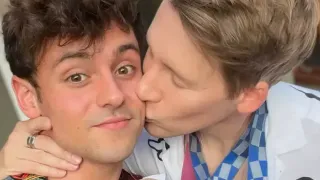June 21, 2017
Eating Disorder Recovery Tips for the LGBTQ Community
READ TIME: 4 MIN.
By Emily Slager, M.Ed., LMHC
Just as eating disorders don't discriminate based on race, age or socioeconomic status, they also do not discriminate based on gender identity or sexual orientation.
While the data isn't extensive, some studies have shown an increased incidence of eating disorders among the LGBTQ community, compared with other populations. If you're a member (or ally) of the LGBTQ community, what do you need to know to help yourself or a loved one struggling with an eating disorder?
Understand the unique risks and challenges that may make you or someone you love more susceptible to developing an eating disorder.
Certainly we understand that there is not one "LGBTQ experience" common to everyone that considers themselves a member of the community.�Studies have shown that eating disorders are much more prevalent among men identifying as gay or bisexual than among men identifying as heterosexual.
Among women identifying as lesbian or bisexual, the prevalence of eating disorders among those who consider themselves feminine have shown to be similar to heterosexual women, but the prevalence is lower in lesbian and bisexual women who consider themselves androgynous or masculine. It can be deduced that this variance is related to the body image ideals within these particular groups.
For transgender individuals, gender dysphoria can often result in efforts to change shape, weight and other elements of appearance that are frequently associated with eating disorders.
Consider the role that sexual orientation or gender identity status may play in perpetuating the eating disorder.
Coming out can bring fear of rejection from friends and loved ones, being that LGBTQ individuals often experience discrimination, bullying and even violence as a result. Not coming out, though, can also contribute to negative self-perceptions, gender dysphoria, lack of support, isolation and other mental health issues that can lead to the development of an eating disorder.
We've seen a number of clients who are able to develop increased support and a sense of community and positive identity by coming out, also experiencing improved self-esteem and confidence.
If you haven't come out, a trusted friend or resources like the It Gets Better Project can provide invaluable support.
Evaluate risk factors specific to your own personal environment and relationships.
What is your body image ideal? What media and sociocultural messages do you hang onto and internalize? What do your friends and loved ones value and aspire to be? If everyone around you is aiming for an unrealistic "thin ideal" or "muscular ideal," then it's likely you'll be impacted by that goal. Finding a community of body positive supports and peers can help shift the focus away from constantly working to change something about yourself. Surround yourself with people who make you feel good!
Find treatment providers and/or programming that are sensitive to your needs, use LGBTQ-affirming language and make you feel comfortable.
When searching for treatment programs or outpatient mental health or medical providers, do your research and ask questions. You deserve to be treated with respect and compassion by providers, and should never lose your sense of comfort. This means treatment staff needs to be well-educated and informed about how to maintain a safe environment for all clients.
Find support in your community outside treatment and, if it doesn't exist, create it!
If you're looking for something you can't find, chances are that others share your need. Certainly, when first seeking treatment and early in recovery, you need to focus on your own needs and avoid getting pulled too much into others' concerns.
However, there may come a point when you want to share your experience to help others through advocacy, awareness or mentorship. Share your story, write a blog, start a support group, volunteer your time -- your efforts can "pay it forward" to the next people who come along sharing your struggles.
Long-term recovery may also mean that you need to shift your social circle, educate family members and loved ones about eating disorders, and distance yourself from people and places that allow your eating disorder to thrive.
Are you (or do you know) a member of the LGBTQ community looking for help? It's important that you get the support that you need.
Emily Slager, M.Ed., LMHC, is director of Walden Behavioral Care's clinic at Hickory Drive in Waltham. She can be reached at [email protected]. Walden offers a full system of specialized care for individuals and families impacted by all types of eating disorders.






